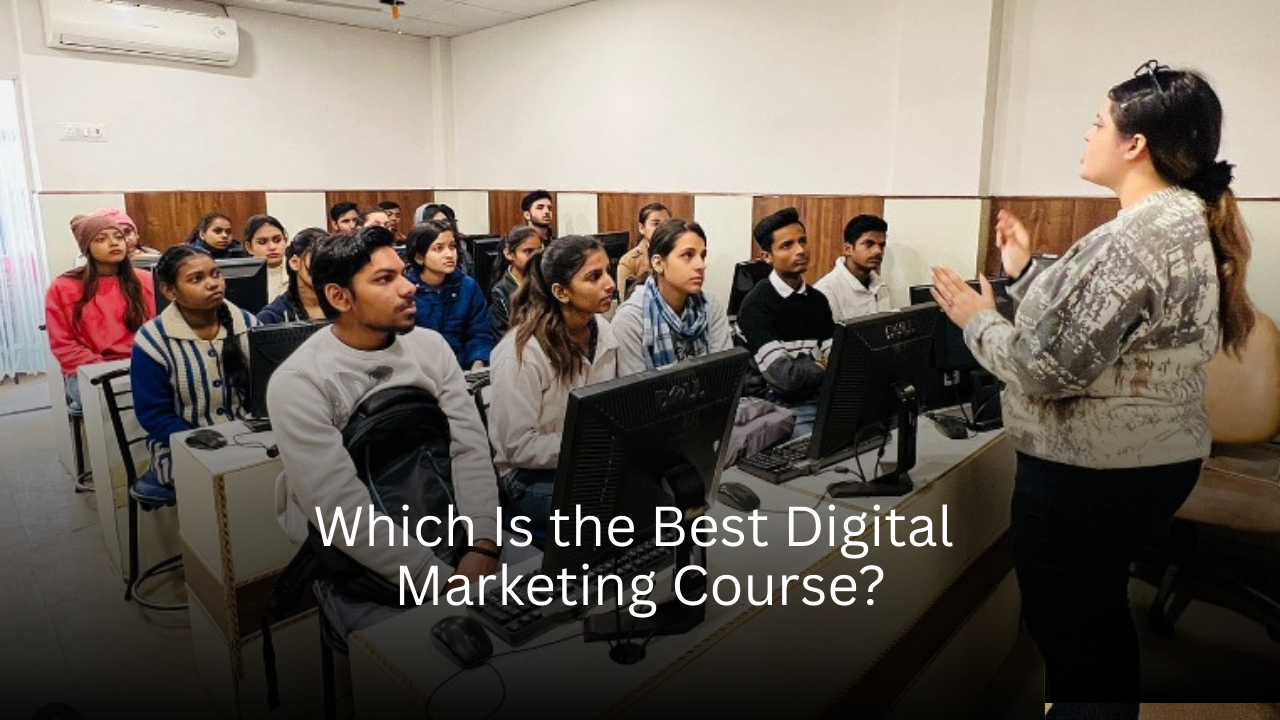“Best” is personal. The right digital marketing course depends on your goal, budget, schedule, and current skill level—not on flashy ads or long syllabi. This guide helps you decide quickly and confidently, then lists excellent options for every need.
1) Start with your goal (pick one primary outcome)
- Get hired in 3–6 months: choose a structured program with projects, mentoring, and placement support.
- Grow your business/freelance income: pick action-oriented training focused on ads, funnels, and analytics with live practice.
- Upskill while working: choose modular, self-paced courses with recognized certificates.
- Become a specialist: go deep in SEO, Meta/Google Ads, Analytics, Email, or Content.
2) What makes a course genuinely “best”?
- Curriculum depth: SEO, SEM (Google Ads), Social, Content, Email, CRO, Analytics (GA4), Marketing Automation, AI tools.
- Hands-on projects: real campaigns, keyword plans, ad sets, dashboards—not just quizzes.
- Mentoring & feedback: live doubt clearing, portfolio reviews, interview prep.
- Faculty credibility: instructors with verifiable campaign experience.
- Career support: internships, placement assistance, or client acquisition playbook.
- Tool access: practice with GA4, Google Ads, Meta Ads, Search Console, Tag Manager, WordPress, Canva, SEMrush/Ahrefs.
- Assessment rigor: capstones, case studies, graded assignments.
- Certification value: recognized names (Google, Meta, HubSpot, top universities).
- Alumni outcomes: portfolios, testimonials, case wins.
- Fit: delivery style (live vs self-paced), schedule, language, price.
3) Top programs by use-case
A. Absolute beginners (free, credible)
- Google Digital Garage — Fundamentals of Digital Marketing
Free, well-structured introduction with certification; great first step. - HubSpot Academy — Digital Marketing/Content/Email certificates
Short, polished modules; strong for inbound and content.
Why choose: zero cost, quick wins, resume visibility.
Gap: limited hands-on campaign budgets and deep analytics.
B. Academic depth & brand value
- Coursera Specialization (e.g., University of Illinois / University of California tracks)
Multi-course pathways with peer projects and a capstone. - Google Digital Marketing & E-commerce Professional Certificate (Coursera)
Beginner-to-job ready path with portfolio tasks.
Why choose: respected names, structured learning, flexible pace.
Gap: mentorship and job support vary by learner’s initiative.
C. Career switchers needing projects + guidance
- Simplilearn Digital Marketing Specialist / Post-Grad tracks
Live classes, capstones, and career services. - Udacity Digital Marketing Nanodegree
Project-heavy with mentor feedback and reviews. - MICA + upGrad (India)
Strong industry alignment, case studies, cohort community.
Why choose: practical projects, interview prep, peer group.
Gap: higher fees; choose only if you’ll finish the capstones.
D. Specialist tracks (go deep)
- SEO: Dedicated SEO roadmaps plus tools (SEMrush Academy, CXL SEO Minidegree-style programs).
- Performance Ads: Google Skillshop + real ad spend practice; Meta Blueprint for Facebook/Instagram.
- Analytics: GA4, Tag Manager, Looker Studio dashboards; add SQL basics if aiming for analyst roles.
- Email & CRM: HubSpot, Mailchimp courses; focus on automation, segmentation, deliverability.
Why choose: fastest ROI for freelancers and agencies.
E. India-focused with placement help
- Digital Vidya CDMM / similar cohort programs
Live assignments, tool training, and placement assistance. - IIT/IIM executive programs (various providers)
Brand value, weekend classes, case-method teaching (suited to working pros).
Why choose: local recruiter familiarity and network.
Gap: outcomes still depend on your portfolio and practice.
4) Fast decision matrix
| Your Situation | Best Fit |
|---|---|
| Unsure where to start, zero budget | Google Digital Garage → HubSpot certificates |
| Need a recognized, structured path | Google Professional Certificate / Coursera Specialization |
| Want projects, mentorship, job support | Simplilearn / Udacity / MICA+upGrad / Digital Vidya |
| Already working; need flexible upskilling | LinkedIn Learning paths + Google/Meta certifications |
| Want to freelance fast | Specialist tracks: SEO + Local SEO + GA4 + Meta/Google Ads |
5) What your portfolio should include (regardless of course)
- SEO case: keyword research, on-page optimization, a content plan, and 60–90-day traffic outcomes (even on a demo site).
- Paid ads case: a small-budget Google or Meta campaign with objective, targeting, creatives, A/B tests, and ROAS/CAC.
- Analytics: GA4 setup, events, UTM plan, and a Looker Studio dashboard.
- Content: 3–5 posts or emails that tie to measurable goals.
- Role-ready resume + LinkedIn with links to your projects.
6) How to vet a course in 15 minutes
- Scan the syllabus: Is GA4/Tag Manager included? Are AI/automation tools covered?
- Ask for a sample project: What deliverables will you ship?
- Check mentor profiles: Real campaign screenshots > generic titles.
- Read 3 recent reviews: Look for specifics about support and outcomes.
- Verify placement claims: Number of partners, interview prep process, and recent student portfolios.
- Trial a class/video: Do you like the teaching style?
7) Estimated budgets (guide)
- Free foundations: ₹0
- Self-paced certificates: ₹3,000–₹25,000
- Cohort/live + projects: ₹30,000–₹1,20,000
- Executive/University brands: ₹80,000–₹2,50,000+
8) Recommended learning path (8–12 weeks)
Weeks 1–2: Foundations (Google Digital Garage) + set up a demo website/landing page.
Weeks 3–4: SEO sprint: keyword research, on-page fixes, publish 3–4 articles.
Weeks 5–6: Paid ads sprint: run a small Google/Meta campaign; document results.
Weeks 7–8: GA4 + Tag Manager + Looker Studio dashboard.
Weeks 9–10: Email/CRM basics; create a 3-email automation.
Weeks 11–12: Compile portfolio, resume, and mock interviews.
FAQs
Q1. Do employers care about certificates or portfolios?
Portfolios win interviews; recognized certificates help you pass screens. Have both.
Q2. Can I learn digital marketing without paid courses?
Yes—start free, then invest in a project-based program to accelerate.
Q3. How long to get job-ready?
With focused practice, 8–16 weeks is realistic for entry roles or freelancing.
Final Answer
There’s no single “best” digital marketing course for everyone. The best course for you is the one that:
- matches your goal,
- provides hands-on projects you can show,
- offers mentorship and feedback, and
- leads to tangible outcomes—interviews, clients, or measurable growth.





What Is A Robots.txt File?
August 23, 2025 - 11:39 am[…] How robots.txt interacts with indexing […]